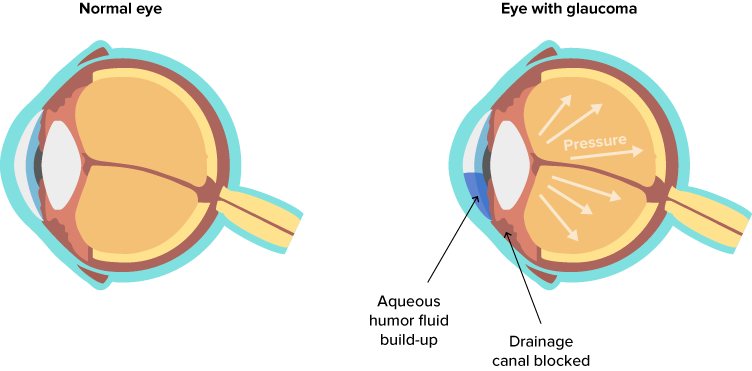Glaucoma refers to a number of eye conditions, where the optic nerve, which connects your eye to your brain, is damaged. It usually occurs when the fluid inside your eye cannot drain properly and the build-up of fluid can increase the pressure on your optic nerve, causing damage.
Glaucoma is a progressive disease that most frequently occurs in individuals over the age of 40, and the risk increases with age.
Who is at RISK?
The people listed below have a greater risk of developing glaucoma.
- Age – Once you are over the age of 40, your risk increases
- Ethnic origin – People of African or Afro-Caribbean origin are at greater risk
- Short-sighted – Higher risk of glaucoma
- Family history – if a close relative like your mother, father, brother or sister suffers from glaucoma, you are at a higher risk
- Medical history – People with diabetes may also be at higher risk
- History of eye injuries
However, you can still get glaucoma even if you are not in the categories above, so regular screening is very important.
What are the SYMPTOMS?
Increased pressure within the eye can damage the optic nerve, which can lead to significant peripheral vision loss if it is not diagnosed and treated early.
In open-angle glaucoma, which is the most common form of glaucoma, there are usually no symptomsuntil the individual experiences severe peripheral vision loss. At this stage, the glaucoma is quite advanced and it can be too late to treat.
In the rarer form of the disease, which we call closed-angle glaucoma, there is a sudden increase in the eye pressure and the individual may experience the following symptoms:
- Pain
- Nausea
- Blurred vision/cloudy vision
- Halos around lights
If you experience these symptoms, you should consult your optometrist immediately, as if left untreated, both forms of glaucoma can lead to complete loss of vision.
How is Glaucoma diagnosed?
The only way to prevent glaucoma progressing is to have your eyes examined regularly. A comprehensive eye examination with one of our highly-trained optometrists allows us to thoroughly screen for glaucoma. As there are typically no early warning signs or symptoms of glaucoma, it is very important to have a regular eye examination even if you are not having any problems. If you can see well, or you don’t wear glasses, a regular eye examination will help detect glaucoma early enough to prevent any visual field loss.
Our optometrist will perform a simple painless procedure during the eye examination to measure the eye pressure. Most people do not like to have the ‘puff’ test, as they find it uncomfortable. We have invested in a newer, quicker and more accurate way of measuring your eye pressure. We will examine your optic nerve and carry out a retinal scan, for better monitoring of any changes, as well as doing a field of vision test. The visual field test we carry out is one of the most advanced on the market.
How can Glaucoma be treated?
If glaucoma is detected and treated early, there is less chance of any further damage occurring. The treatment is usually regular eye drops every day, and laser surgery if required. The aim of the treatment is to maintain your vision and prevent little, or no further, loss of vision.
If left untreated, the peripheral vision is affected first, followed by loss of central vision, in the late stages of the eye disease. Glaucoma creates a tunnel vision effect, and once the damage has occurred, it is unfortunately irreversible.
TIP
The best way of protecting yourself from developing glaucoma is to have a comprehensive eye test every year.



